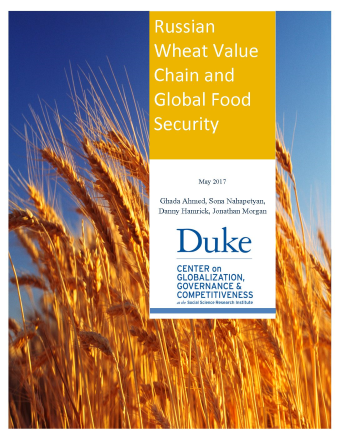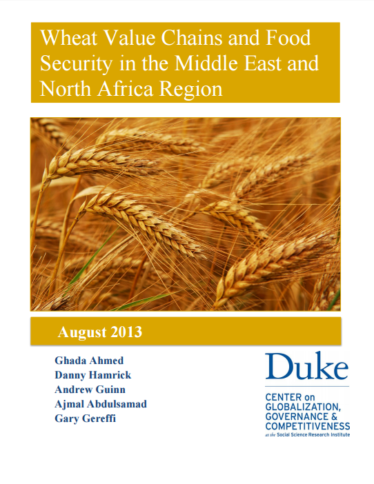 Civil unrest in the Middle East and North Africa (MENA) has periodically affected oil and gas exports from the region, helping to drive global surges in fuel prices, and in turn food prices. If future food price spikes last too long, they could exacerbate social unrest in MENA that leads to regional conflict and widespread malnutrition/starvation.
Civil unrest in the Middle East and North Africa (MENA) has periodically affected oil and gas exports from the region, helping to drive global surges in fuel prices, and in turn food prices. If future food price spikes last too long, they could exacerbate social unrest in MENA that leads to regional conflict and widespread malnutrition/starvation.
The Duke GVC Center has been addressing this complex topic as part of its work with the Minerva Initiative and the Army Research Office (ARO) since 2012. The Minerva Initiative is a Department of Defense-sponsored, university-based social science research initiative launched in 2008 by Robert Gates, the U.S. Secretary of Defense at the time. The Initiative seeks to build deeper understanding of the social, cultural and political dynamics that shape regions of strategic interest around the world.
Challenge: The Duke GVC Center research team’s goal was to identify the energy-exporting countries in the region whose grain imports are at most risk to insecurity. Through a number of projects and analyses, the team is identifying specific risks to the supply chains and suggesting prioritized defensive and/or proactive strategies to deal with problems arising from food shortages in MENA. The approach should provide a framework for conducting similar security analyses involving trade in commodities elsewhere in the world.
Approach & Outcomes: The interdependencies between global trade and local access to wheat and wheat products can be best understood through the GVC lens. Duke researchers used the GVC framework to first understand the industrial organization of the global wheat industry and then how the chain operates in Egypt, Iran, Saudi Arabia, Syria and the United Arab Emirates. The five key findings from the report are as follows:
As a follow-up, Duke GVC Center researchers have published research briefs that examine the wheat value chains in Syria and Morocco. They also studied the increasing role the Black Sea region (Russia and Ukraine) has on food trade into the MENA region.Impact Summary
“The Duke GVC Center does interdisciplinary work – a key strength from our perspective. They’re helping us to understand the interdependencies across different social systems (e.g., political, climate change, economics). I don’t believe there’s anyone else in the world doing this level of work in value chains.” – Lisa Troyer, Senior Research Scientist, Army Research Office, Social & Behavioral Sciences Program
More information about the Duke GVC Center’s work with the Minerva Initiative and the Army Research Office can be found at the following link.

